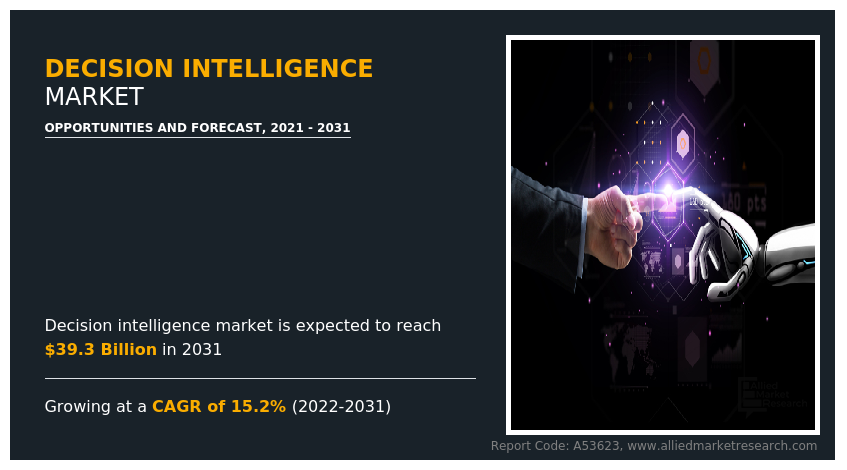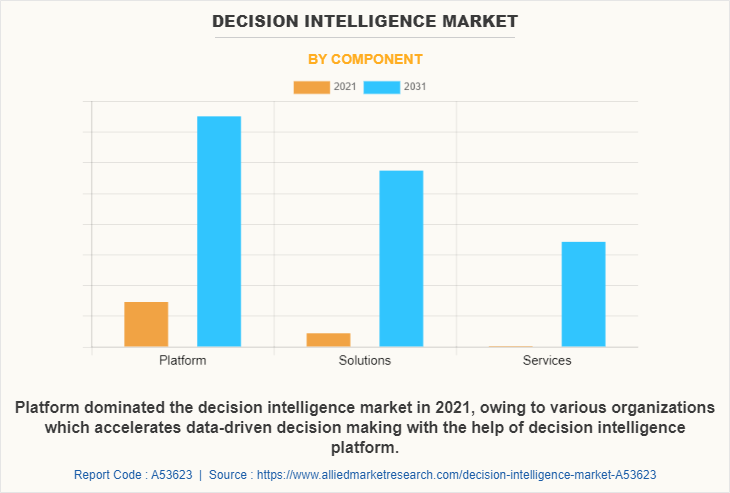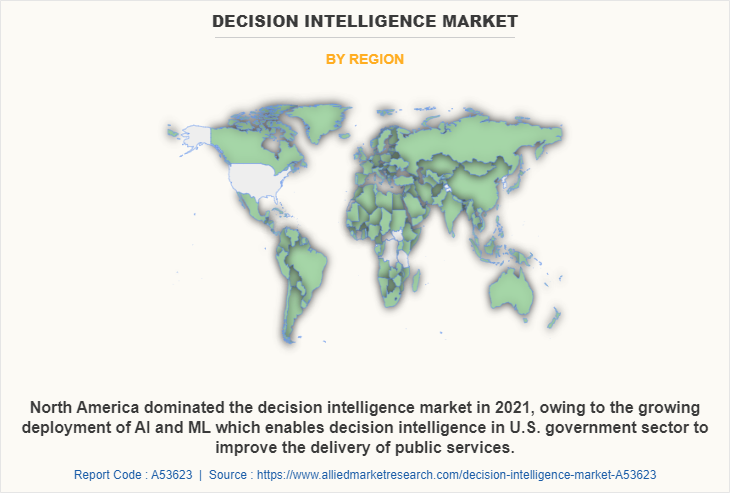Decision Intelligence Market Insights, 2031
The global decision intelligence market was valued at USD 9.8 billion in 2021, and is projected to reach USD 39.3 billion by 2031, growing at a CAGR of 15.2% from 2022 to 2031.
Factors such as big data technology advancements for practical business intelligence and the advent of ML and AL are enabling a variety of sectors to fully utilize decision intelligence primarily driving the growth of the market. However, worries about data security and privacy seem to hamper the decision intelligence market growth to some extent due to abundance of information, reliance on a decision support system, and adoption of decision intelligence. Moreover, rapid advancements in big data technology will lead to actionable business information, which is expected to provide lucrative opportunities for the market growth during the forecast period.

Decision intelligence links data with choices and results to support, enhance, and automate business decisions. To enhance the way decisions are made in businesses, it combines techniques (such as decision mapping and decision theories) with technologies (such as automation and machine learning). Constantly assessing choice results and enhancing them through a feedback mechanism are both aspects of decision intelligence.
Moreover, a significant portion of the revenue development of the global decision intelligence market is anticipated to be driven by the growing need to reduce specific risks related to human decision-making. One of the most prevalent problems in companies is poor decision-making, which can reduce productivity and raise the cost of products.
However, DI technology can assist in addressing and relieving poor human decision-making through the computation and analysis of data arrays, the making of intelligent predictions based on historical data, and the more accurate suggestion of the best possible decisions according to inputs, that can be utilized later to predict error-free decisions.
The global market is segmented on the basis of component, deployment mode, enterprise size, industry vertical, and region. On the basis of component, it is segregated into platform, solutions, and services. On the basis of deployment mode, it is segregated into cloud and on-premises.
On the basis of enterprise size, it is segregated into large enterprises and small and medium-sized enterprises (SMEs). On the basis of industry vertical, it is segregated into energy and utilities, BFSI, IT and telecom, government, healthcare, manufacturing, retail and consumer goods, and others. On the basis of region, it is segregated into North America, Europe, Asia-Pacific, and LAMEA.
The decision intelligence industry is dominated by key players such as Google LLC, Oracle Corporation, Microsoft Corporation, Board International, Metaphacts GmbH, H2O.ai, International Business Machines Corporation, Intel Corporation, Diwo.ai, and Clarifai, Inc. These players have adopted various strategies to increase their market penetration and strengthen their position in decision intelligence industry.

Depending on the component, the platform segment dominated the decision intelligence market share in 2021 and is expected to continue this dominance during the forecast period, owing to surge in data-driven decision-making with the aid of a decision intelligence platform. The platform democratizes the potential of data science and ML algorithms to empower both technical and non-technical consumers to reach previously unattainable insights.
However, the solutions segment is expected to witness the highest growth in the upcoming years, owing to analytics challenge by combining various decision-making methodologies with AI, ML, contextual intelligence, and automation to produce actionable and unique business recommendations that can be instantly implemented to produce business value.

Region wise, the decision intelligence market size was dominated by North America in 2021 and is expected to retain its position during the forecast period, owing to advanced technologies such as AI, ML, intelligent apps, and natural language queries to transform data dashboards and business analytics into more comprehensive decision-support platforms. However, Asia-Pacific is expected to witness the highest growth in the upcoming years, owing to data scientists and engineers, as well as the potential of vast automation and AI/ ML projects in the region, enterprises across Asia-Pacific leverage engineered decision making for substantial and consistent positive decision making.
Top Impacting Factors
Big data technology advancements for practical business intelligence
Decision intelligence is one of the rapidly expanding fields in data science and artificial intelligence. Many issues related to decision intelligence-related software have been resolved and incorporated that are used on the Internet, such as dialectal analysis. To build reliable systems that can handle big data at enormous scales, perform text analysis and subjectivity analysis, and support management and business decision-making, big data analytics and decision intelligence can be merged.
The advent of ML and AL is enabling a variety of sectors to fully utilize decision intelligence
Decision intelligence is developing as a response to the urgent need to digitize and utilize cutting-edge technologies like Artificial Intelligence (AI) and Machine Learning (ML). Al and ML both assist decision intelligence by refining anticipating and predictive ability. Moreover, decision intelligence is used by organizations to aid imbrute and intensify decision-making processes beyond an extensive range of application scenarios and industries. Also, decision intelligence fills the gap between data and better decision-making for organizations struggling to survive in a sea of data.
Furthermore, industries like financial services, healthcare, and supply chain may benefit from decision intelligence by getting the most out of the data and realizing the full promise of Al. Currently, these sectors have a critical need for precise decision-making. In addition, by examining the data gathered from various sources, providers have been able to better understand customer views due to the advent and adoption of ML and AL. Businesses now prioritize providing a consistent user experience across all platforms and delivering offers in real-time by examining consumer purchasing trends.
Digital Capabilities:
Businesses are looking to get a higher return out of artificial intelligence (AI) and machine learning (ML) along with great insights. AI as applied to the business of decision-making enables the use of data to both analyze and formalize the decision-making process and optionally automate the decision. Business also use automation in decision intelligence platforms to enhance their services and improve productivity.
In addition, automation in decision intelligence involves the use of data, machines and algorithms to make decisions in a range of contexts, including public administration, business, health, education, law, employment, transport, media and entertainment, with varying degrees of human oversight or intervention. Furthermore, automation in decision intelligence uses artificial intelligence, data, and business rules to help organizations automate the decision-making process across several areas. Using automation in decision intelligence increases productivity, and there is a reduction in risk and error in the decisions made.
Regional Insights
North America
North America is the leading region in the decision intelligence market, driven by advanced technological infrastructure, a high concentration of key players, and significant investments in AI and analytics. The U.S. is particularly prominent, with organizations across sectors such as finance, healthcare, retail, and manufacturing adopting Decision Intelligence solutions to improve operational efficiency and decision-making accuracy. The presence of major tech firms and research institutions contributes to rapid innovation and development in this space. Furthermore, increasing data volume and complexity compel companies to adopt sophisticated tools to derive insights from their data.
Europe
Europe is also a significant market for Decision Intelligence, with countries like the UK, Germany, and France at the forefront. The region's strong emphasis on data privacy and regulatory compliance drives organizations to seek advanced decision-making solutions that align with these regulations. Industries such as healthcare, automotive, and finance are early adopters of Decision Intelligence technologies, using them to enhance predictive analytics, risk management, and operational efficiency. Additionally, government initiatives promoting AI and data analytics are fostering growth in the region, encouraging businesses to leverage Decision Intelligence for better policy-making and strategic planning.
Asia-Pacific
The Asia-Pacific region is expected to witness the fastest growth in the market, fueled by rapid digital transformation and increasing investments in AI technologies. Countries like China, India, and Japan are leading this trend. In China, government support for AI initiatives and a burgeoning tech ecosystem are driving the adoption of Decision Intelligence solutions across various sectors, including manufacturing and logistics. India is also seeing a rise in startups leveraging AI for data analytics, enhancing decision-making in industries like retail and finance. Japan’s focus on automation and robotics further boosts the market, as companies seek to improve operational efficiencies through intelligent decision-making.
Latin America and Middle East & Africa
In Latin America, the decision intelligence market is growing, particularly in Brazil and Mexico, where organizations are increasingly adopting AI and data analytics to enhance business processes. The region’s improving technological infrastructure and growing e-commerce sector contribute to this growth. In the Middle East & Africa, countries such as the UAE and South Africa are witnessing a rise in demand for Decision Intelligence solutions. The UAE's focus on becoming a global AI hub and South Africa’s emphasis on data-driven decision-making in industries like mining and agriculture are key drivers in the region.
Key Industry Developments
- March 2024 – IBM launched a new Decision Intelligence platform that integrates advanced AI algorithms with business analytics tools. This platform is designed to help organizations across North America make more informed decisions by providing real-time insights into data trends and patterns.
- July 2023 – SAP announced enhancements to its Decision Intelligence capabilities within its Business Technology Platform in Europe. These enhancements aim to streamline data processing and analysis, enabling organizations to optimize their decision-making processes while ensuring compliance with GDPR regulations.
- January 2024 – Microsoft introduced new features in its Azure platform, focusing on Decision Intelligence for healthcare providers in Asia-Pacific. This initiative allows healthcare organizations to leverage AI-driven insights for improved patient outcomes and operational efficiencies.
- September 2023 – Deloitte launched a Decision Intelligence advisory service aimed at helping businesses in Latin America harness data analytics and AI to drive strategic decision-making. This service focuses on industries such as retail and finance, offering tailored solutions for local businesses.
- October 2023 – Google Cloud expanded its Decision Intelligence offerings in the Middle East by partnering with regional organizations to implement AI-driven analytics solutions. This initiative aims to enhance decision-making capabilities in sectors like logistics and tourism, aligning with the UAE's vision for a data-driven economy.
Key Benefits for Stakeholders
- This report provides a quantitative analysis of the market segments, current trends, estimations, and dynamics of the decision intelligence market analysis from 2021 to 2031 to identify the prevailing market opportunities.
- The decision intelligence market research is offered along with information related to key drivers, restraints, and opportunities.
- Porter's five forces analysis highlights the potency of buyers and suppliers to enable stakeholders make profit-oriented business decisions and strengthen their supplier-buyer network.
- In-depth analysis of the decision intelligence market forecast assists to determine the prevailing market opportunities.
- Major countries in each region are mapped according to their revenue contribution to the global market.
- Market player positioning facilitates benchmarking and provides a clear understanding of the present position of the market players.
- The report includes the analysis of the regional as well as global decision intelligence market trends, key players, market segments, application areas, and market growth strategies.
Decision Intelligence Market Report Highlights
| Aspects | Details |
| Market Size By 2031 | USD 39.3 billion |
| Growth Rate | CAGR of 15.2% |
| Forecast period | 2021 - 2031 |
| Report Pages | 327 |
| By Component |
|
| By Deployment Mode |
|
| By Enterprise Size |
|
| By Industry Vertical |
|
| By Region |
|
| Key Market Players | Board International, International Business Machines Corporation, H2O.ai, Intel Corporation, Metaphacts GmbH, Microsoft Corporation, Google LLC, Diwo.ai, Oracle Corporation, Clarifai, Inc. |
Analyst Review
Decision intelligence combines technologies such as AI and automation that links data with decisions, actions and outcomes. As a result, the demand for decision intelligence rises as it helps to produce insights based on data and use them to generate decisions, execute those decisions and support the feedback process by evaluating their effectiveness. AI-driven companies meet changing customer demands very often. Therefore, decision intelligence helps address the business need which helps to accelerate AI or ML operationalization to support quality and enhanced decision making.
Key players of the decision intelligence market are Board International, Clarifai Inc., Inc., Diwo.ai., Google LLC, H2O.ai, IBM Corporation, Intel Corporation, Metaphacts GmbH, Microsoft Corporation and Oracle Corporation that account for a significant share of the market. With larger requirements for decision intelligence, companies introduced various strategies to strengthen their market position capabilities. For instance, in March 2022, Google acquired Mandiant. The acquisition of Mandiant’s unparalleled decision intelligence and expertise gives speed and scale to google. The acquisition complements Google cloud’s existing strengths in security. Together with Mandiant, Google Cloud delivers an end-to-end security operations suite with even greater capabilities as well as advisory services helping customers address critical security challenges and stay protected at every stage of the security lifecycle. Such strategic initiatives by the market players contribute in significant growth of decision intelligence market across the world.
Moreover, market players have expanded their business operations and customers by enhancing their product portfolio. For instance, in July 2022, Diwo launched the Diwo decision intelligence (DI) platform, which helps accelerate the path from data to decisions by providing business users with AI-powered, actionable recommendations in minutes rather than days. It delivers actionable recommendations directly to the decision-maker who simply reviews the recommendation to understand trade-offs and business impact, validates it, and then puts it into action. In addition, the decision intelligence platform eliminates bottlenecks and drastically reduces the time and effort necessary to make strategic, tactical and operational decisions. Such developments advancements are propelling the growth of decision intelligence market.
The global decision intelligence market was valued at USD 9.8 billion in 2021, and is projected to reach USD 39.3 billion by 2031
The global decision intelligence market is projected to grow at a compound annual growth rate of 15.2% from 2022 to 2031 to reach USD 39.3 billion by 2031
North America is the largest regional market for decision intelligence market
Market players operating in the decision intelligence market include Google LLC, Oracle Corporation, Microsoft Corporation, Board International, Metaphacts GmbH, H2O.ai, International Business Machines Corporation, Intel Corporation, Diwo.ai, and Clarifai, Inc.
Factors such as big data technology advancements for practical business intelligence and the advent of ML and AL are enabling a variety of sectors to fully utilize decision intelligence primarily driving the growth of the market.
Loading Table Of Content...
Loading Research Methodology...



